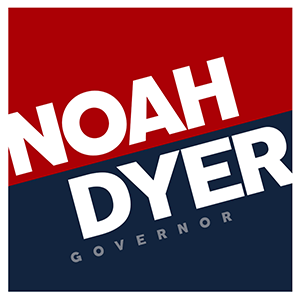Noah’s Financial History Explained
On Voter Interest in Elected Official Finances
Why are voters interested in the finances of their elected officials? There are probably many reasons.
One hypothesis voters may have is that people who are upright in their personal matters will also be upright in their public administrations. Voters who believe in this hypothesis will be interested in financial information insomuch as it may contain information about a candidate’s willingness to honor their agreements. Alternatively, personal financial records may reveal their propensity for cheating.
Voters may also theorize that a person who does not make wise financial decisions personally cannot be trusted to make wise financial decisions for the public they would represent if elected to office. These voters would look for information regarding risky borrowing and wasteful spending.
Many voters appear to assume that someone who has created vast personal wealth understands the formula by which vast personal wealth can be created for everyone the candidate will represent. These voters will simply be interested in the size of the fortune the candidate has amassed.
Lastly, it cannot be ignored that one probable reason is that voters are simply interested in gossip. The finances of public officials can sometimes be as interesting as a revealing dress on the red carpet, or a celebrity photographed wearing a t-shirt to the store to buy milk. All these voters want is something unexpected and juicy.
But Are These Useful Measures?
One need look no further than our current government situation to know that the above ideas about the relationship between the personal financial health of politicians and the financial health of the government is not borne out in practice.
The National Debt is nearly $20 trillion, which vastly exceeds annual federal government revenues of about 2.5 trillion. And that is just hard debt. When you include unfunded liabilities, the figure is closer to $130 trillion. If the national government could magically shut down and stop spending completely and pay 0% interest on the debt, but still collect taxes at the same rate as today, it would take about 8 years to get in the black. That balloons to over 50 years if you include unfunded obligations
At the state level, Arizona has over $60 billion in debt, on income of about $13 billion. If the state could somehow achieve the magical terms above, it would take nearly 5 years to pay off the debt.
This isn’t a situation that was created by people like me. This is a situation that was created by people who have little experience with personal debt, and who apparently have no problem piling government debt on their constituents.
I have less than $90k in debt on about $65k income. If I could apply all my income to my debt I’d be debt free in less than a year and half. That makes me 3 to 6 times better off than the governments that represent me, governments that are supposedly run by people who have been vetted for their fiscal responsibility.
A Simple Plan
Of course, the fictional opportunity to focus all our resources on paying off debt will not materialize for the state, the nation, or me personally. But I do have a plan to get out of debt. It will not be long until my child support obligation begins decreasing. By applying that money to my student loan debt, I will be debt free in less than 15 years. To achieve this, I do not have to earn any more than I am earning now, or otherwise change my income and expenses. I can just keep doing what I’m doing.
Neither the state nor the nation have anything resembling a 15 year payoff plan. That is something I intend to change for Arizona.
Looking at Noah’s Finances More Closely
Having spoken generally about my personal finances and compared that to the financial state other politicians have created for our government, let’s further examine what my financial situation illustrates about my personal qualities and my ability to generate prosperity for Arizonans.
First, I’ll just come out and say it. I have at times made simply unwise financial decisions. For example, I sold a home at the beginning of the recovery after the internet bubble (2003), resulting in a very low return. Alternatively, I bought a home at the height of the housing bubble (2006), resulting in the home losing 75% of it’s value and a subsequent short sale.
The majority of the decisions I’ve made that fall into this category were made in my 20s. Being young is not an excuse for financial mismanagement, but it is fair to say that I didn’t really understand how money works.
Growing up, my parents were poor and not particularly wise with the little money they did make. I was not exposed to any education about financial cycles and how to prepare for them, avoid risk, or position oneself for profit. Though I had completed linear algebra, neither my parents, nor my high schooling, nor my university classes had really exposed me to financial mathematical principles. Sure, I broadly understood that saving and investing is good, and debt is bad, but I didn’t truly understand how those things contributed to financial well being.
Having experienced some of the fallout because of the choices I made while I lacked understanding has certainly led to me gaining a greater understanding of how personal finances work. Additionally, since that time the experiences I’ve had as an entrepreneur, earning my Master’s in Business Administration, and the many books I’ve read have also given me real world experience and academic knowledge that have significantly advanced my understanding of business finances and government finances. My path also makes me sensitive to the plight of many Arizonans who, like me, make mistakes not because they are dishonest or don’t care, but because they don’t understand how money works, or are overly optimistic about their future prospects.
The mistakes I made generally occurred between 2006 and 2009, one of the least forgiving times in history for a person to slip up financially. There is no evidence that I was intentionally careless or reckless to begin with, or that I have repeated the behaviors that caused my financial hardships. Nor is there any evidence that I’ve borrowed money to fund a lavish lifestyle with expensive cars, homes, clothes, or other goods. In short, I’ve made mistakes, but I’ve also learned from my mistakes. I believe that process has made me more financially vigilant, more financially responsible, and more likely to stand up for the financial safety of other Arizonans like me.
Generating Wealth for Others
What about personal wealth as a sign of one’s ability to create prosperity for the people they lead?
Doug Ducey campaigned on his ability to generate wealth for the state based on the millions he generated for himself while running Cold Stone Creamery. But let’s look closer at that experience. Doug Ducey generated millions for himself while creating hundreds of minimum wage jobs, dozens of managerial jobs in which people got compensated below the state median income, and even fewer good paying jobs for executives and professionals. So by paying people low wages, he was able to generate millions for himself and perhaps a few others.
Why should the voters of the state be excited about experience like that? What they should see is someone who has a talent for creating lopsided systems in which hundreds of low wage workers generate wealth for a small handful of people. Is that what we want for Arizona? I don’t think so. We want a state that has high paying jobs that allow people to take care of their families.
Though I have not created hundreds of jobs, I have created a handful. The jobs I’ve created were primarily STEM and creative jobs, such as those for graphic artists, project managers, computer programmers, and similar. The compensation we offered our employees and contractors was at least double minimum wage, going up to $75 per hour.
In addition to creating jobs that people can be proud of, I’ve stood by my employees in times of trouble. In 2012 the marketing agency that I co-founded lost our 2 largest clients in a single month through no fault of our own. Those accounts accounted for over 50% of our revenue. In that situation, most business owners would have laid off people in order to reduce expenses. In fact, Doug Ducey laid off 25% of his corporate workforce when there was no crisis, just to create more profit for the people who were already making millions.
That’s not what my partner and I did when we faced real hardship. Instead, I went without salary for a year so we could keep our employees on while we tried to replace the revenue we’d lost. Ultimately, we did have to let some people go, but we were able to keep others. The people who we did let go had sufficient time to be able to find another job while taking care of their obligations in the meantime.
The loss of that business was going to cause hardship for someone; it was going to show up in someone’s balance sheet. As the business owner, I had the opportunity to choose how that would happen. I could have preserved my own income and forced others to deal with the financial pain. But that’s not what I did, I chose to bear as much pain as possible myself, and stand by the people who I had hired. And I’m OK with the fact that I have a higher debt and fewer possessions for it today.
Similarly, I am proud of my child support arrangement. At the time of my divorce, my former wife wanted to continue to be a stay at home mom. To facilitate that, I willingly agreed to pay over 3 times the legal requirement. Child support has since been modified, but I still pay substantially more than the minimum each month. It’s important to me that the mother of my children be happy, which I know directly affects my children’s happiness. This has certainly limited my ability to pay off debt at an accelerated rate or buy creature comforts, but I am OK with that.
It’s Time
In summary, Arizona’s weakened financial position was created by people who touted their personal wealth and financial acumen. What those people really show is a willingness to sacrifice the interests of their employees and constituents to protect and expand their private luxuries at all costs. My personal financial position is stronger than the State of Arizona, as is my plan for eliminating my personal debt. I have a solid understanding of financial and economic principles. I know what Arizona needs to do to be on better financial footing as a state, and create more economic opportunity for all.



Leave a Reply
Want to join the discussion?Feel free to contribute!